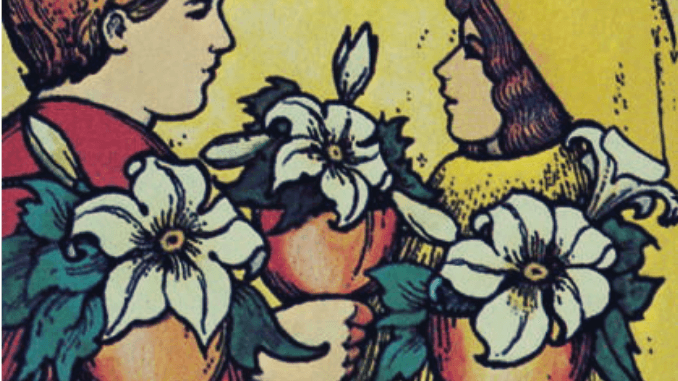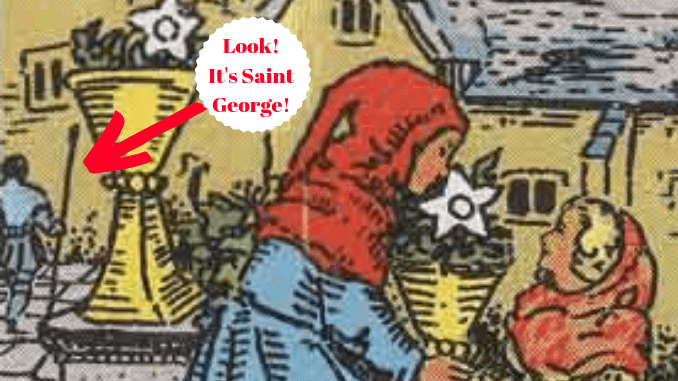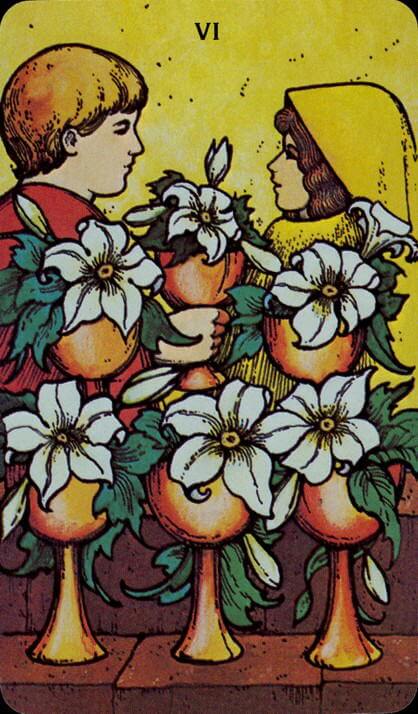Well, the watery theme continues for another day – a rainy Mo(o)nday here in Hiroshima as it happens! Today is also, and rather unusually, due to the lateness of Easter, Saint George’s Day and it is good to see our Saint George keeping guard in the background of the Rider Waite version of this arcana:
We are often told that the 6 of Cups illustrates a happy time in the past, as if it were somebody recollecting such a time, and it is their recollection that we see in the illustration. Looking at it, we can feel a sense of security and the satisfaction that people can draw from tending to their gardens, especially when gardening is a joint project. The sixes in the Lower Arcana are connected both to the (6) Lovers in the Upper Arcana, which is the arcana of Easter Week, and also to the Knights in the Courtly Arcana; we see our own Saint George protecting our activities in the card today, as I have mentioned. Saint George is represented by the Knight of Swords, but here he is wearing blue out of sympathy for the watery element of the cups.
Now, one thing the (6) Lovers represent is a choice, and when the 6 of Cups shows up I am always reminded of Iago, a man able to use empathy for wicked ends, whose reputation for honesty is established by uttering many a truth, such as for example, his speech to Roderigo in which he likens our human will as gardeners who can choose plant in the gardens of our bodies; that is, we can choose to use reason to control our “sensuality” if we choose to, while “love” is merely an offshoot (“a sect or scion”) of “unbitted” (like a horse without a bit) “lust”:
Virtue! a fig! ’tis in ourselves that we are thus or thus. Our bodies are our gardens, to the which our wills are gardeners: so that if we will plant nettles, or sow lettuce, set hyssop and weed up thyme, supply it with one gender of herbs, or distract it with many, either to have it sterile with idleness, or manured with industry, why, the power and corrigible authority of this lies in our wills. If the balance of our lives had not one scale of reason to poise another of sensuality, the blood and baseness of our natures would conduct us to most preposterous conclusions: but we have reason to cool our raging motions, our carnal stings, our unbitted lusts, whereof I take this that you call love to be a sect or scion.
William Shakespeare, Othello 1: 3
In a similar way, using the tarot may be likened to a form of spiritual gardening in which we act as the gardeners of our souls. We do not imagine that the “influence” of the stars or the arcana operate upon us like virtues beyond our control. Instead, in the spirit of Ficino, we, like good gardeners learn to read the signs and to plant this suggestion next to that one, working with our wills interacting with the contingent turn of the cards or the coincidence of the seasons and weeks with what turns up on the table and on the screen of our consciousness. This process is a joyful one to pursue as it, like Ficinian magic, brings us into harmony with ourselves, our daily lives and affairs, the times and seasons of the year, and the motion of the planets and stars through which we may come to be blessed with a glimpse of the Divine.
So, today, I suggest that you remember the lessons of the previous week, and amid the plethora of events that we are presented with this week, remember what it is that brings you joy, and go forward in that spirit through the week.




